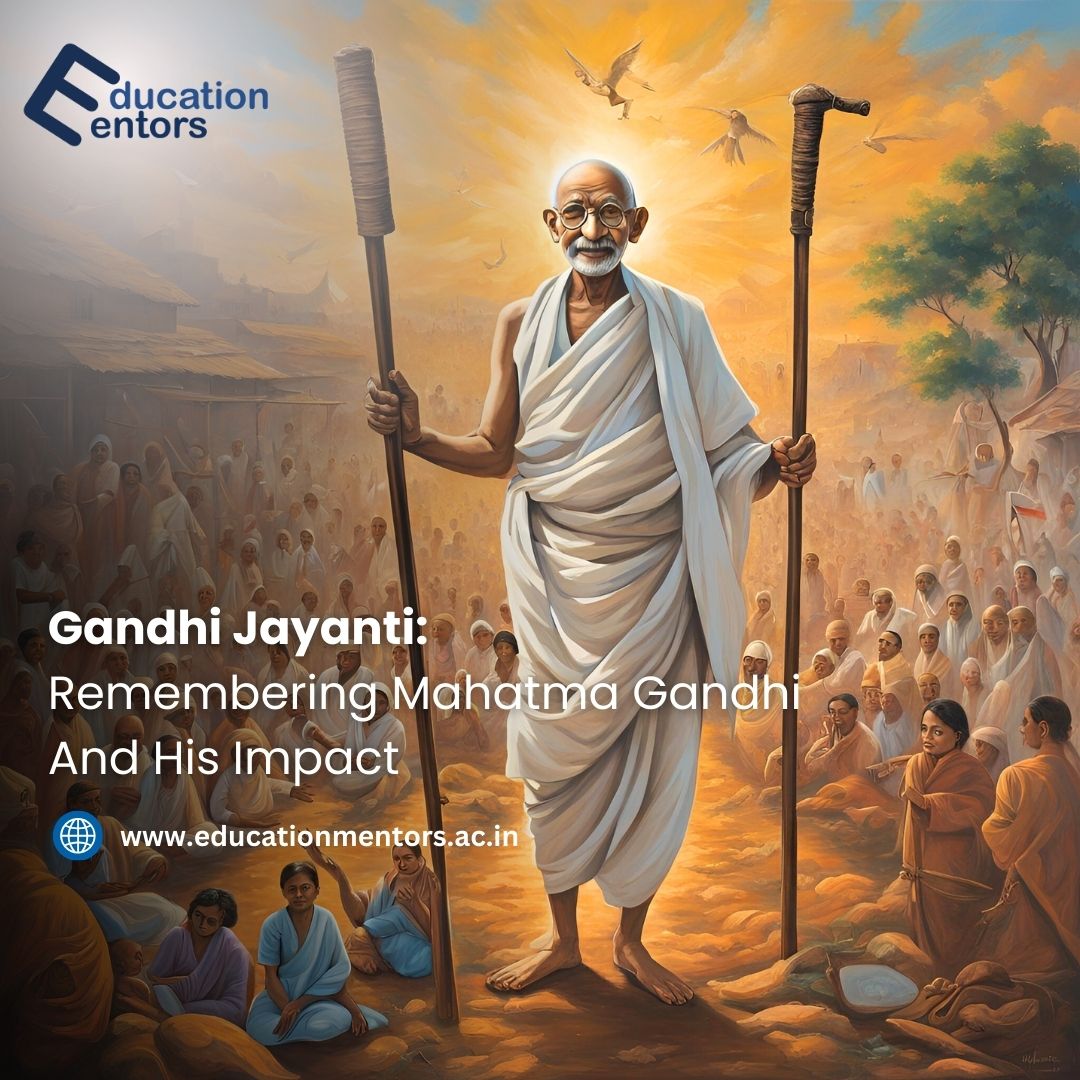Gandhi Jayanti: Remembering Mahatma Gandhi And His Impact
Mahatma Gandhi, known fondly as Bapu, was a man whose simplicity and profound wisdom have touched the lives of millions across the globe. His birthday, celebrated as Gandhi Jayanti on the 2nd of October, is a day when we remember his monumental contributions to India’s freedom struggle and the enduring values he left behind. He once said, “The best way to find yourself is to lose yourself in the service of others,” a principle that resonates deeply with the idea of selfless service and humility.
For Education Mentors Academy students, this day serves as an important reminder that beyond textbooks, education is about instilling values like truth, non-violence, and service to others. Gandhi Ji’s teachings remain as relevant today as they were during the tumultuous times of India’s fight for independence. In this blog, we will explore his life, the movements he led, the principles he stood for, and some lesser-known facts about him.
Gandhi’s Life and Legacy
Born in 1869, Mahatma Gandhi dedicated his life to the pursuit of truth, justice, and non-violence. He was a leader, a visionary, and most importantly, a servant of the people. His philosophy of ahimsa (non-violence) and satyagraha (truth and passive resistance) became powerful tools in India’s fight for independence from British rule. But more than just freeing India from colonialism, Gandhi sought to uplift society through unity, equality, and compassion for all.
Gandhi’s influence extended far beyond the borders of India. His commitment to non-violence inspired civil rights movements across the globe, from Martin Luther King Jr.’s fight for racial equality in the United States to Nelson Mandela’s struggle against apartheid in South Africa. Today, Gandhi remains a symbol of peace, advocating that real change comes not through force, but through understanding, empathy, and selfless action.
Movements Gandhi Ji Took Part in During the Freedom Struggle
Mahatma Gandhi was at the forefront of many pivotal movements during India’s independence struggle. His method of non-violent resistance became a model for civil rights movements around the world. Some key movements led by him include:
- Non-Cooperation Movement (1920–1922): Gandhi Ji encouraged Indians to withdraw their cooperation from the British administration, boycott British goods, and promote swadeshi (indigenous) products. This movement saw mass protests, strikes, and demonstrations all over the country.
- Salt March/Dandi March (1930): The Salt March was a 240-mile journey led by Gandhi Ji to protest the British monopoly on salt. This march became a symbol of civil disobedience and inspired millions of Indians to challenge unjust British laws.
- Quit India Movement (1942): During World War II, Gandhi Ji initiated the Quit India Movement, demanding an end to British rule in India. He coined the slogan “Do or Die,” calling upon Indians to resist British control through mass protests and strikes.
- Civil Disobedience Movement: Gandhi Ji championed the idea of breaking unjust laws in a non-violent manner. This included refusal to pay taxes, particularly the salt tax, and peaceful protests to demand Indian sovereignty.
These movements demonstrated the power of unity, non-violence, and determination, leaving a lasting impact not just on India’s independence, but on global movements for civil rights.
Gandhian Ideologies and Teachings
Mahatma Gandhi’s ideologies were based on universal principles of justice, love, and equality. Some of his core teachings include:
- Non-Violence (Ahimsa): Gandhi Ji believed that true strength lies in non-violence. He practiced and preached Ahimsa as a means to resolve conflicts and overcome injustice.
- Truth (Satya): For Gandhi Ji, truth was the ultimate principle, guiding every action and decision. He said, “Truth is God,” emphasizing the need for honesty in both personal and public life.
- Self-Sufficiency (Swadeshi): Gandhi Ji encouraged Indians to embrace local goods, crafts, and industries to reduce dependence on British products. The spinning wheel (charkha) became a symbol of self-reliance.
- Equality and Social Justice: Gandhi Ji fought against caste discrimination, untouchability, and the marginalization of the poor. He championed equality for all, regardless of religion, gender, or caste.
- Simple Living and High Thinking: His life was a testament to living simply, advocating for minimalism, and focusing on the upliftment of others rather than accumulating material wealth.
Interesting Facts About Gandhi Ji
While many know Gandhi Ji as a leader, there are some lesser-known facts about him that add further depth to his personality:
- Studied Law in London: Gandhi Ji trained as a lawyer in London before returning to India and eventually leading the freedom struggle.
- First Satyagraha in South Africa: Before leading India’s independence movement, Gandhi Ji started his first protest against racial discrimination in South Africa, where he lived for 21 years.
- A Vegetarian Advocate: Gandhi Ji was a strong proponent of vegetarianism, viewing it as an ethical choice that aligned with his beliefs in Ahimsa.
- Time Magazine’s Person of the Year: In 1930, Gandhi Ji was named Time Magazine’s Person of the Year for his role in India’s freedom struggle.
- Nominated for the Nobel Peace Prize: Gandhi Ji was nominated for the Nobel Peace Prize five times but was never awarded it. Despite this, his contribution to peace and non-violence is universally acknowledged.
How to Celebrate Gandhi Jayanti Meaningfully
Gandhi Jayanti is more than just a public holiday; it is a time for reflection and renewal of commitment to Gandhi Ji’s values. Here are a few ways to celebrate this day meaningfully:
- Acts of Service: Follow Gandhi Ji’s footsteps by engaging in acts of service to others, whether through community service, charity, or simply helping those in need.
- Practice Non-Violence: Resolve conflicts in a peaceful manner, and make an effort to resolve disputes non-violently in your personal life.
- Promote Swadeshi: Support local artisans, industries, and products, just as Gandhi Ji encouraged during the independence movement.
- Educate and Inspire Others: Share stories, books, or documentaries about Gandhi Ji’s life to inspire the younger generation to understand and follow his principles.
Conclusion
Mahatma Gandhi’s life is a testament to the power of truth, love, and non-violence. His legacy transcends time and continues to inspire people worldwide to strive for justice, equality, and freedom. As we celebrate Gandhi Jayanti, let us not only honor his memory but also commit ourselves to living by the values he upheld. By embracing his teachings, we can create a more peaceful and just world for future generations.
For students at Education Mentors Academy, let Gandhi Ji’s words and actions serve as a guiding light in your academic and personal lives. Remember, “The best way to find yourself is to lose yourself in the service of others.”







